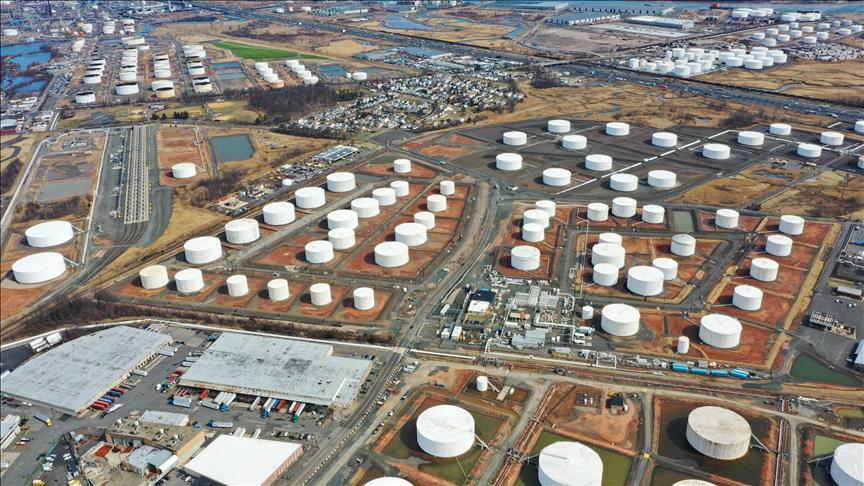Brent crude prices which saw a four-week decline due to growing recession fears in the US, the world’s largest oil consumer, increased by 2.7% during the week ending August 9.
The data from the employment report in the US raised concerns that economic activity might slow more sharply than anticipated, fueling expectations of a potential recession and contributing to the drop in prices.
However, the possibility that the Federal Reserve might urgently convene and cut interest rates to ease market tensions has heightened concerns about the economic outlook, contrary to predictions, and further supported the fall in oil prices.
As a result, the price of Brent crude fell to $74.93 per barrel, its lowest level since January 3rd.
On the other hand, the decrease in unemployment benefit claims reported on August 8th in the US alleviated some recession fears, preventing further declines in oil prices.
Thus, Brent crude, which had been losing value for the past four weeks, saw a 2.7% increase in price this week.
“Traders are going to custom to sporadic incidents cause oil prices to rise, but only then to fall again after no disruption takes place,” Bob McNally, President of Washington-based energy consultancy Rapidan Energy, told Anadolu.
McNally emphasized that it is unlikely for oil prices to rise significantly in the foreseeable future, however, political events could temporarily drive prices up.
While Iran will continue to attempt to limit its retaliation to avoid a regional war, McNally noted that the Israel-Iran conflict is trending sporadically but continually in that direction.
“Any material interruption in the oil and gas that flows from the Arabian Gulf to global markets would cause a severe, but potentially short, price spike that would only exacerbate the macroeconomic that are already weighing on oil prices,” he said.
Fereydoun Barkeshli, President of the Vienna Institute for Energy Studies, underlined that the assassination of Hamas Political Bureau Chief, Ismail Haniyeh in Iran on August 1st was a major tragedy impacting global markets.
‘Hours after the news broke out, the price of Brent crude oil increased by approximately $1.10 per barrel, however, it didn’t sustain. Market reactions depend on retaliatory measures that could follow the assassination.” Barkeshli said.
Barkeshli noted that reactions from the countries in the region, the US, and other countries could complicate the situation further and have a profound impact on global oil markets.
He pointed out the difficulty in predicting the extent of the risk premium in the current tense environment and noted that significant supply issues could arise if the tension spreads to the Strait of Hormuz, through which 25% of globally traded oil passes.
Barkeshli added that there are almost no threats to supply security other than the region.
The aim of the Organization of the Petroleum Exporting Countries (OPEC) is to keep oil prices within the $80 to $85 range to meet its budgetary needs, which is also seen as another factor that could profoundly affect the oil market.
“In case the US dollar keeps losing value and the US and other producers continue to dig into the OPEC market share for a long time exceeding 2025, I believe that a fierce market share war will be on the horizon,” Barkeshli said.
– Central banks’ inflation-reduction policies may encourage oil producers to raise prices
Barkeshli noted that if the Federal Reserve and the European Central Bank (ECB) continue their current inflation-reduction policies, the US dollar will likely weaken against other currencies, leading to reduced earnings for oil exporters, while encouraging oil producers to raise prices.
Explaining that interest rate cuts are a tool used by large economies to stimulate growth, Barkeshli said, ‘An increase in the GDP growth in major economies leads to higher oil consumption. Oil-producing economies have to adopt a compromise between short-term gains and long-term demand growth. Most oil producers are under pressure to earn more to support their development plans. Therefore, they are not happy with the Central Bank’s rate cuts in the Western capitals.”
According to Osama Rizvi, an energy and economy analyst at the US-based market intelligence company Primary Vision, the oil markets are expected to continue experiencing downward pressure. He added that, in the absence of geopolitical risks, prices could potentially fall below $70 before 2025.
“The investors should be looking at the Chinese oil demand and central bank announcements. Federal Reserve’s policy rate and its tone is also another important indicator as to where things might be headed. We need to keep a close eye on the investor sentiment especially the consumer spending along with the contours of the wider OPEC+ group,” Rizvi concluded.

